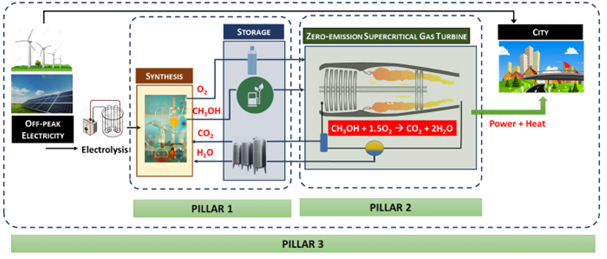project information
Full title: | Highly Efficient Super Critical Zero Emission Energy System |
Acronym | HERMES |
Funding/Programme | Horizon Europe |
Duration | 2022-2025 |
Partners | National Technical University of Athens (GR), EXERGIA (GR), TEC4FUELS (DE), OWI Science for Fuels (DE), Imperial College (UK), CERFACS (FR), PAUL SCHERRER INSTITUT (CH), OPRA (NL), EPFL (CH), Wroclaw University of Science and Technology (PL) |
project description

Wind and sun will be central energy sources of a climate neutral Europe 2050, bringing with them the need to balance weather dependent differences between supply and load. Conventional gas turbines can fulfill this task also for longer periods even well as they can stabilize the grid with their capability of quick start/stop. However, their efficiency is limited and – even if burning climate neutral hydrocarbons – they still produce local emissions.
HERMES overcomes these limitations and advances gas turbine technology to the future-proof level by creating a reliable, flexible, zero-emission solution for energy supply with long term impact at EU level. HERMES develops and assesses the first highly efficient closed-loop supercritical zero emission energy system. It is based on directly fired supercritical gas turbine engine operating on locally synthesized renewable liquid and gaseous fuels (e.g. methanol or hydrogen) coupled with decentralized carbon capture utilization and storage (CCUS). The carrier medium is highly dense supercritical carbon dioxide or xenon demanding less compression power. Therefore, and because of operating at high pressure conditions (above 150 bar), the system achieves significantly higher efficiency (above 65%) than today’s gas turbines. By utilizing pure oxygen for fuel oxidation, and by capturing bulky flow of exhaust products (H2O and/or CO2) and reusing them for fuel synthesis, the system produces virtually no pollutants. A detailed assessment of the HERMES approach will be done using experimental and computational approaches and dynamic simulation tools including digital twins and machine learning.
The 36-month project is realized by an 11-partner consortium including 3 SMEs with expertise in renewable energy, combustion, techno-economics and socio-political science. Hermes will pave the way to a major breakthrough in the understanding of fundamentals of combustion in supercritical fluids with zero emission of any pollutants.

